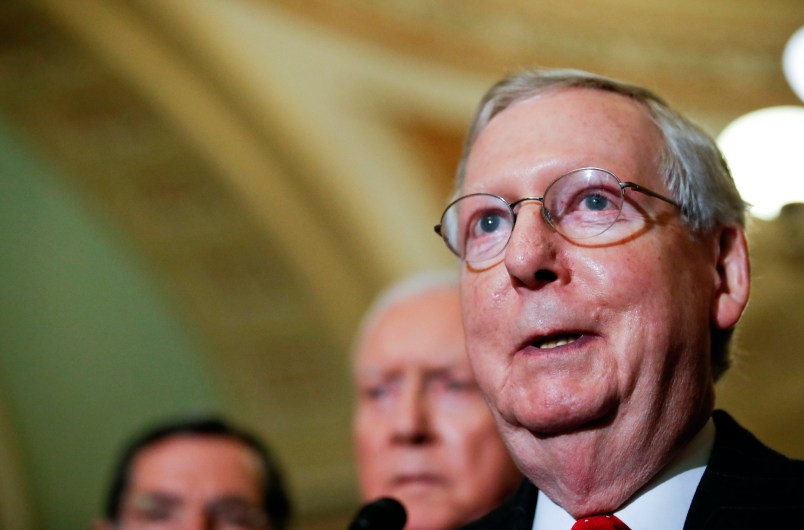Late Tuesday night, the Senate passed a massive overhaul of the nation’s tax system, locking in massive corporate tax cuts and major changes to individual rates, and eliminating the Affordable Care Act’s individual mandate.
The bill passed the Senate after midnight on Tuesday by a 51-48 margin, after a number of Republican senators who had once voiced concerns over the sprawling bill’s deficit-ballooning price tag, its outsized benefits for the rich and large corporations, and the damage it will do to health insurance markets eventually shrugged and voted yes.
Sen. John McCain (R-AZ), who dramatically tanked Republicans’ bid to repeal the Affordable Care Act this summer, was absent due to complications in his cancer treatment, and will not return to the Senate until next year.
Over the objections of every single Democrat and a dozen Republicans, the House passed the tax bill Tuesday afternoon. But after a handful of provisions were discovered that violated the Senate’s rules, the House sheepishly announced it would have to vote again on Wednesday before the bill can head to President Donald Trump for his signature.
Since it was introduced just a few weeks ago and as it sailed through the House and Senate with no hearings, minimal mark-ups, and several nights of backroom negotiations, the tax legislation has been deeply unpopular with the public.
The final bill also eliminated many of the original draft’s most controversial provisions. Graduate students will no longer be taxed on the value of their scholarships. Tax breaks for student loan interest, major health care expenses, and adoption will be preserved. The mortgage interest deduction was lowered from $1 million to $750,000 — but not to the $500,000 originally envisioned in the House plan. Similarly, deductions for state and local taxes have been capped at $10,000 — a blow to some suburban communities but nothing compared to the House’s original move to eliminate the deductions altogether. The estate tax exemption has been doubled but the tax itself survived.
But plenty of major provisions opposed by Democrats survived the negotiations, including the repeal of Obamacare’s individual mandate, which is expected to increase the number of uninsured Americans by at least 13 million. Democrats and a small handful of Republicans have also sounded the alarm about the overall cost of the bill, which by government and independent estimates will grow the federal deficit by at least $1 trillion over 10 years.
But many of the self-styled fiscal conservatives in the Senate who raised concerns about the deficit as the bill was being drafted—including Sens. Bob Corker (R-TN), James Lankford (R-OK) and Jeff Flake (R-AZ)—dropped their concerns and agreed to vote yes in the end, even though no changes were made to the bill to reduce that cost or raise more revenue.
Flake, who like Corker is retiring at the end of his current term, said he agreed to back the measure in exchange for a promise from the Trump administration to be included in negotiations around a permanent fix for DACA recipients—the hundreds of thousands of undocumented young people whose protections were stripped away by the Trump administration earlier this year.
Though Flake has told TPM that those negotiations have been happening, Republican leadership shows no sign of acting on DACA before the end of the year, putting thousands of people at risk of deportation.
Another former holdout on the tax bill, Sen. Susan Collins (R-ME), agreed to vote yes based on assurances from President Trump and Senate Majority Leader Mitch McConnell (R-KY) to support two health care bills aimed at mitigating the expected damage from the tax bill’s provision killing Obamacare’s individual mandate. McConnell has promised to attach these bills to the continuing resolution to fund the government up for a vote later this week, but House Republicans say they stand no chance of passage.










